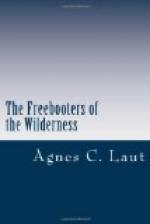The Ranger again had that curious sensation of the earth slipping away from his foot steps. He had thrown away his leather coat early in the morning. Now be found himself tearing off the loose red tie round the flannel collar of the Service suit; and he pulled himself sharply together recognizing the fevered instinct to strip off all hampering clothing. It was as much a heat-death symptom as sleep forbodes frost death. He did not walk in a daze as the old man rode, half numbness, half drowse. He walked with a throb—throb—throb in his temples like the fall of water. He wanted to run; to strip himself as an athlete for a race; and all the time, he kept walking as if the heaving earth went writhing away from each step.
“Don’t y’ think ye better open that pack, an’ get a drink for y’rself, my boy?”
Wayland was pausing in the shadow of a sand butte, and the old man had ridden up.
“Want it for yourself?”
“Not a drop.”
“Better keep it for the horses, then; if we can keep them going to the next spring, they’ll carry us out. Anything the matter with me that you ask that?”
“Oh no; A thought A saw you wave y’r arms.”
The Ranger looked at the elder man. He was riding leaning forward heavily; and the dust had trenched deep fatigue lines in the hollow beneath his eyes and from the nostrils to the mouth. Wayland didn’t retort that the frontiersman’s speech had sounded guttural and muffled. He was not sure it was not the fault of his own ears.
They worked slowly to the crest of the sand roll, zig-zagging to break the steepness. An ash-colored shadow skulked along the tracks of the outlaw trail. The little mule gave a squealing hind kick. The shadow looked back: it was a coyote, scenting the tracks of the drovers’ lame horse. It went loping over the sand a blurr of gray.
“Curious thing that, Wayland! Notice the antics of the mule? Always see that in a range bred beast, centuries of ham stringing.”
The Ranger did not answer. The sand was no longer heaving in waves. It was running, sliding like the glossy surface of the sea. The throb of his temples, the slide of the sand, the lakes of light, light and crystal pools, that ran away as you came up, all brought visions of water. The dust cloud on the sky line dipped and disappeared behind a ridge of rolling sand.
There was the drowsy swash of saddle leather and the padded chug of dragging feet and the hum, the hypnotic hum, of the heat that drowsed from delirium to sleep.
“I think,” said Wayland, “this seems a pretty good jumping-off place for a rest.”
The afternoon was waning. They were under shelter of a sand bank from the wind and sun.
“A think, Wayland, this is nearly my jumping off place altogether.”
Matthews spoke feebly. On pretense of steadying the fagged broncho, the Ranger helped him to dismount. Then, Wayland unsaddled and drew the water bag from the pack trees. He handed it over to the old man. Matthews pushed it aside: “Keep it for yourself to-morrow. If y’ find no spring, y’ll need the water to-morrow; but A’ll take y’r flask of brandy if y’ don’t mind?”




